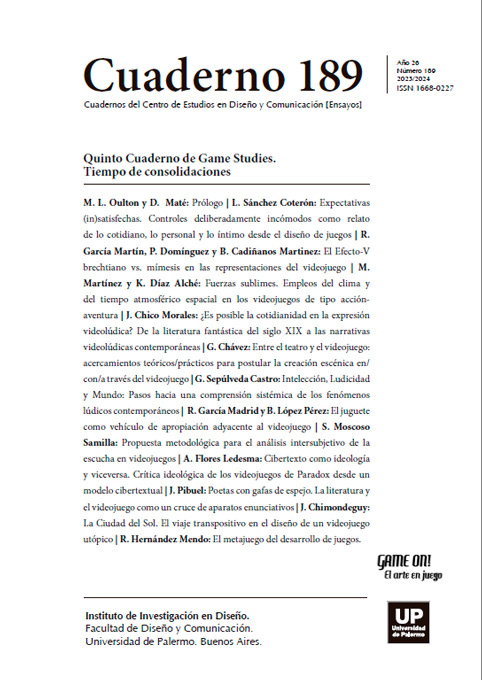El metajuego del desarrollo de juegos
Résumé
Ciertos videojuegos poseen cualidades particulares cuando permiten a sus jugadores el poder crear niveles o juegos propios, pueden posibilitar una mayor comprensión del proceso de desarrollo de videojuegos.
Références
Deleuze, G. Guattari, F. (2004) Mil mesetas. Capitalismo y esquizofrenia. Pre-Textos..
Donovan, T. (2010) Replay. The History of Videogames. Yellow Ant.
Gamespot (2 de febrero de 2009) Gamespot Presents: Geoff Keighley behind the games.
SIMply Divine. The story of Maxis Software. The Idea. Archive.org. https://web.archive.org/web/20090202040300/http://www.gamespot.com/features/maxis/page2.html
Juul, J. (2019) Handmade pixels. Independent Video Games and the Quest for Authenticity. MIT Press.
Kojima, H. (2021) The Creative Gene. How Books, Movies and Music Inspired the Creator of Death Strainding and Metal Gear Solid. Viz Media.
Langaria (4 de febrero de 2016) El creador de Undertale desmiente los rumores de la versión de Wii U. Langaria. https://langaria.net/2016/02/04/el-creador-de-undertale-desmientelos-rumores-de-la-version-de-wii-u/
Morin, E.; Ciurana, E.; Motta, R. (2003) Educar en la era planetaria. Gedisa.
Schön, D. (1988) El profesional reflexivo. Cómo piensan los profesionales cuando actúan. Temas de Educación Paidós. Paidós.
Winnicott, D. (2005) Playing and Reality. Routledge.
Zagal, J. (2011) Ludoliteracy. Defining, Understanding and Supporting Games Education. ETC Press.
Los autores/as que publiquen en esta revista ceden los derechos de autor y de publicación a "Cuadernos del Centro de Estudios de Diseño y Comunicación", Aceptando el registro de su trabajo bajo una licencia de atribución de Creative Commons, que permite a terceros utilizar lo publicado siempre que de el crédito pertinente a los autores y a esta revista.


